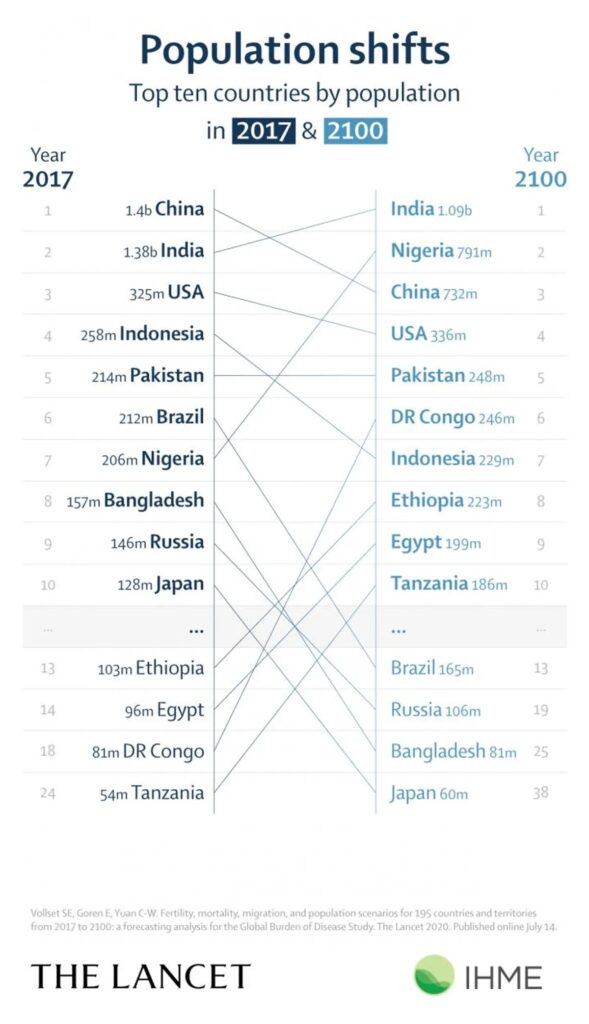
“This will truly be a new world, one we should be preparing for today.”
Within the next century, it is anticipated that the world’s population will begin to drop for the first time in modern history, ushering in a “revolution in the tale of our human civilization” and significant changes in how people spend their lives.
At this time, there are about 7.8 billion people on the planet. According to a recent study published in The Lancet, that number is expected to increase over the following few decades and reach a peak in 2064 at over 9.7 billion people before decreasing to 8.8 billion by 2100.
“The Black Plague’s impact on the mid-14th century global population reduction is notable. If our prediction is accurate, population reduction will for the first time be caused by declining fertility rather than occurrences like pandemics or hunger, according to Stein Emil Vollset, main study author and professor of global health at the Institute for Health Metrics and Evaluation (IHME).
Up to 23 nations, including Japan, Thailand, Italy, Spain, Portugal, South Korea, and other nations with aging and low birth rates, could see their populations decline by more than 50%. Even China, a nation frequently linked to unchecked population expansion, is expected to see a decline in population from 1.4 billion in 2017 to 732 million in 2100.
Some regions of the world are expected to experience an increase in population despite the worldwide trend of diminishing world population. Included in this are North Africa, the Middle East, and, most significantly, Sub-Saharan Africa, whose population is projected to increase from 1.03 billion in 2017 to 3.07 billion in 2100.
Using information from the Global Burden of Disease Study 2017, the new study by scientists from the IHME at the University of Washington School of Medicine examined how mortality, fertility, and migration will impact the world’s population over the ensuing 80 years. It also takes into account how armed conflict, natural disasters, and climate change may affect the number of fatalities in various regions of the world.

The causes of the world population drop are intricate and complicated, but they are supported by a general downward trend in birth rates that is fueled by the empowerment of women and access to contraception.
Improvements in access to contemporary contraception and the education of girls and women are the two main drivers, according to Vollset. The average number of children a woman has over her lifetime, which is the main predictor of population, is driven by several factors. From 2.37 in 2017 to 1.66 in 2100, the world total fertility rate is expected to continuously drop, significantly below the minimal rate (2.1 live births per woman) thought to be required to maintain population levels.
Along with these shifting tides, there will be other profound changes in geopolitical power as well as how billions of people live their lives globally. One of the biggest changes will be the sharp fall in the working-age population in several nations, which might have an adverse impact on their economies and the global geopolitical balance of power.
In a world with numerous superpowers, it is unclear who would be in charge, but based on the largest total gross domestic product, China was predicted to surpass the US and become the largest economy by 2035. (GDP). But by 2098, if their predictions come true, the US will retake the top rank.
According to Dr. Richard Horton, editor-in-chief of the Lancet, “the story of our human civilization will undergo a revolution in the 21st century.”
“Our future will be shaped by Africa and the Arab world, with Europe and Asia losing ground. The globe will be multipolar by the end of the century, with the US, China, Nigeria, and India as the major powers “Added he.
“We should start preparing for this new future now,” the author said.
The new research makes the case that the way the world views migration will need to change. Despite a rise in nationalist leaders and hatred toward immigrants over the past few decades, the analysis predicts that many nations will have to choose more lenient immigration policies in order to sustain their population sizes and support economic growth.
Migration would eventually become a requirement for all nations and not an option, predicted University College London (UCL) professor Ibrahim Abubakar, who was not involved in the study, in an accompanying comment piece.
“Migration has well-known benefits for economies and public health everywhere. We must decide whether to permit planned population movement in order to increase health and wealth or risk creating unstable nations with an underclass of foreign labor.
“Whether humankind thrives or withers will depend critically on the distribution of working-age populations.”

Leave a Reply